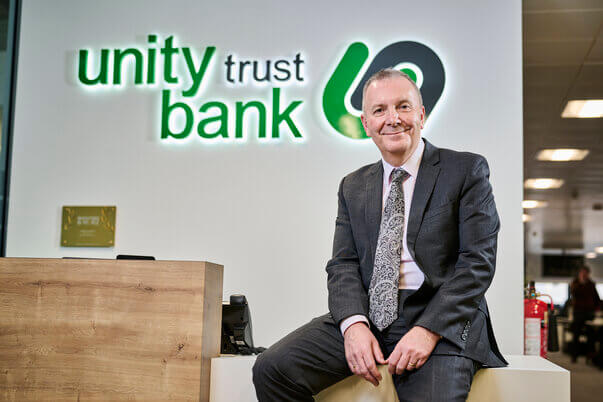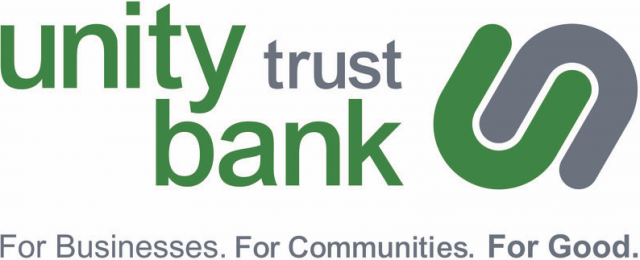Unity Trust Bank is not your typical business bank: it believes making a positive impact to be of equal importance to making a profit.
Founded by the Co-op Bank and trade unions in 1984, and now fully independent, Unity helps organisations in the UK to prosper while creating measurable economic, social and environmental change.
As it celebrates its 40th year, we asked Unity’s new CEO Colin Fyfe what it does differently to other business banks – and what the next 40 years might look like.

Colin Fyfe, CEO of Unity Trust Bank
What makes Unity unique as a business bank?
In 1984, the Co-op Bank and a number of trade unions got together to create a bank that is fully focused on doing good in local communities. That was a revolutionary idea at the time. It was very much the days of ‘How much can banks make?’ – profitability was king and appeasing shareholders the priority.
Unity was set up to focus on what counts rather than on what is counted, and it has stuck to that principle for every one of its 40 years. In December 2015, Unity separated from the Co-op Bank to stand on its own two feet. The temptation then could have been to leave the story about impact behind and focus solely on financials. Not a bit of it!
The organisation has led with its social purpose all the way through and that will definitely continue. It has grasped the opportunity to be a role model for other banks and businesses. It is Unity’s ownership that gives us the chance to feel and act that way.
Why did you want to join Unity as CEO?
I worked for more traditionally-run business banks for 29 years and was driven by wanting to put the customer first. But the reality is, when you are a listed entity and subject to quarterly earnings reviews by analysts, it’s really difficult to stick to that principle. I then worked within building societies, which are owned by their customers. That was an eye opener. Around the board table, the question would always be, ‘What would the customer say and do right now?’ That’s a great discipline to have to ensure you aren’t straying down a route that destroys value or aims solely for profitability.
When the opportunity came up with Unity, it was the perfect balance for me. It puts the worlds of business banking and social purpose together. This is something there is a desperate need for.
How does Unity balance impact with profit?
We will walk away from lending opportunities or taking funds under deposit where there is no alignment to our values or no impact that we can measure and report for that particular local community. That’s a brave discipline.
You look at some business opportunities where the profit margin is there. The easiest thing in the world would be to put that on your balance sheet. But Unity has resisted that and I think it’s one of the things that makes it really special and appeals to people who want to know, ‘Can a bank stick to its values and live them?’
It’s relatively easy for any organisation to talk about values and purpose, but I think the prizes are there for those who actually bring it to life in how they act every day.
What are Unity’s strengths and what do you want to improve?
Where Unity excels is 1) being absolutely dedicated to ensuring its lending and deposits work hard and do good and 2) having relationship managers that listen to business and understand business.
The latter seems so easy, but it’s where many organisations stumble. A lot of SMEs are being neglected by their banks. 40 years ago they would have had a bank manager they could talk to in person but, by and large, that has left the high street. The centralised nature of support from the bigger banks means that these important conversations aren’t taking place. We have experienced relationship managers working across the country, which means we really get to know businesses and local communities.
In terms of the future, we recently rebuilt our internet banking and this year we will bolt on additional services that a business, charity or social organisation will look for. We’re striving to deliver the best human service possible as well as digital efficiency.
What do the next 40 years hold for Unity?
We are proud of our 40 years’ heritage, and plan on building on this in the next 40. I want to raise awareness of who we are and what we do, and don’t see it being difficult to enthuse people about Unity.
We are ambitious from the board all the way through the organisation – but we’re ambitious without being reckless. We describe this as ‘safe growth’. We don’t give off a perception that size is all that matters.
What changes do you see happening in the wider banking industry around impact?
The biggest step change will come from responsibilities that banks and building societies have around climate. The regulators – the Prudential Regulation Authority and Financial Conduct Authority – have been good at taking big topics and distilling them down to ask, ‘What part do you need to play in this?’ The actions of banks and building societies are going to be held more to account.
This increased scrutiny will come not only from above, but also from the public I would like to think that in the future, the man and woman in the street and the businesses they run will be thinking more about values as one of their buying decisions. That’s for us to turn up the dial.
The noise we make won’t be born from ego, it’s simply a case of saying, ‘By banking with us, you know your money is doing good.’
This article is in partnership with Unity Trust Bank.




